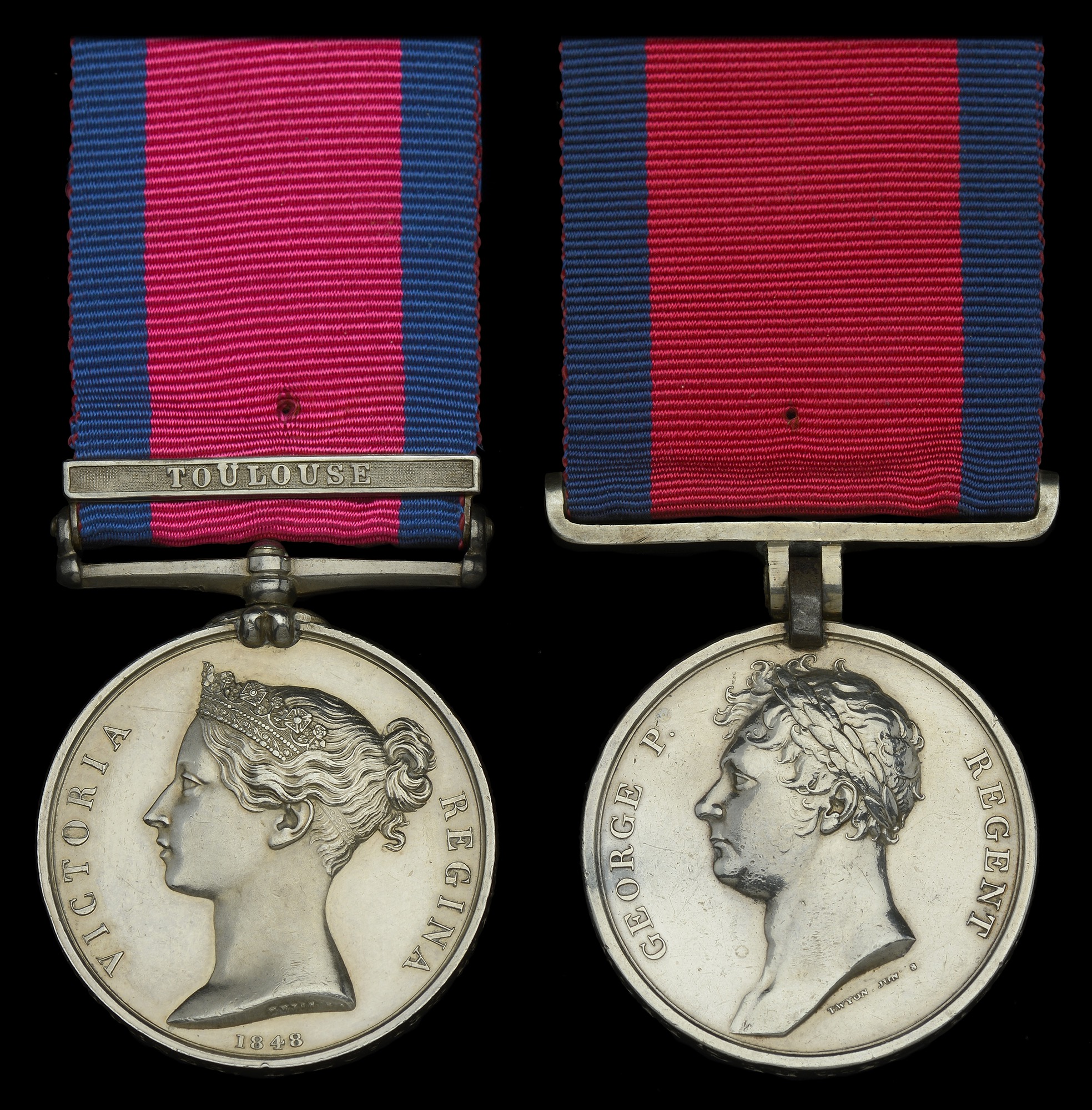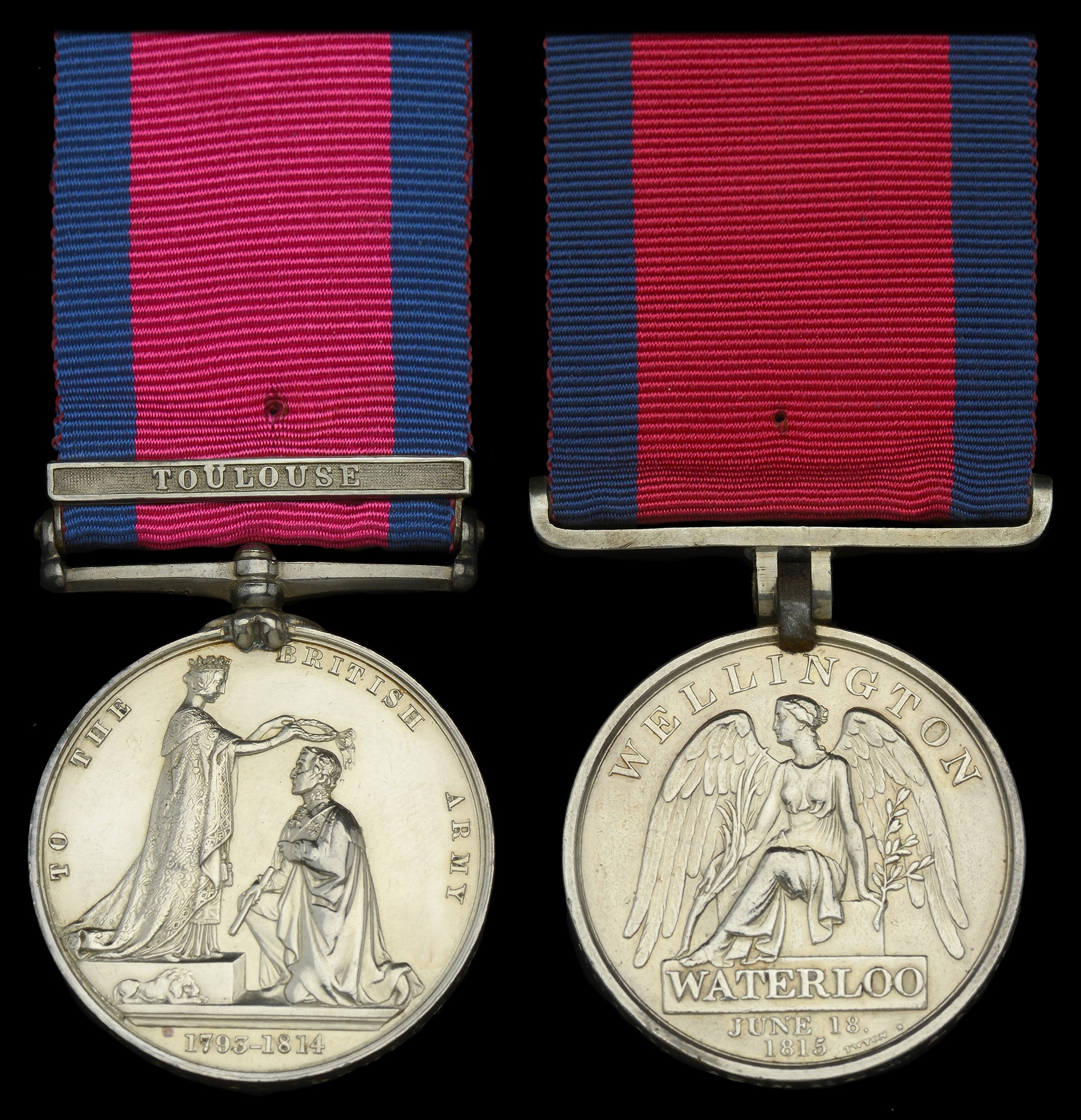Pair: Major William Turner, 13th Light Dragoons, who has his horse shot from under him and afterwards wrote a fine account of the battle and march on Paris Military General Service 1793-1814, 1 clasp, Toulouse (W. Turner, Lieut. 13th Lt. Dgns.); Waterloo 1815 (Lieut. W. Turner, 13th Reg. Light Dragoons.) fitted with original steel clip and silver bar suspension, the second with light contact marks, otherwise good very fine, the first extremely fine (2) £5,000-£7,000 --- William Turner was appointed a Cornet in the 13th Light Dragoons on 23 May 1811, and promoted to Lieutenant on 6 February 1812. He served in the Peninsula from June to October 1812, in April 1814, being present at the battle of Toulouse, and in 1815 at the battle of Waterloo. He was promoted to Captain in the 78th Foot on 3 November 1819, and was placed on half-pay on 27 June 1822. He was made Brevet Major in the 78th Foot on 10 January 1837, and died on 7th December 1849, aged 59 years. He is buried in St Peter’s Churchyard, Norbury, Staffordshire, where a Cross was erected in his memory. A long and detailed letter from Lieutenant William Turner, which gives a graphic account of the battle of Waterloo and the march to Paris was published in C. R. B. Barrett’s History of the XIII Hussars. It reads: ‘Villepeut, near Paris, 3rd July 1815. My dear Busby,—I assure you it is with the greatest pleasure I can find time to inform you I am perfectly sound and in good health and spirits. We marched into this village last night from near Louvres, and are only nine miles from Paris and can distinctly hear the firing, which takes place at Paris, between the Prussian advanced posts and the French. This war cannot possibly last long, for every town and village is completely ransacked, and pillaged by the Prussians and neither wine, spirits, or bread are to be found. The whole country from the frontier to Paris has been laid waste by the march of troops, and the crops nearly destroyed, we are waiting for the Prussians when that infernal City Paris will be attacked and no doubt pillaged, for it is a debt we owe to the whole of Europe, all the inhabitants for leagues round here have taken themselves and their effects into Paris, so that it will be worth taking if we loose 20,000 men. You have no idea of the enthusiasm of the troops and their determination to carry before them everything in their way, the Prussians are also determined soldiers and I expect in one week Paris will be completely sacked and perhaps burned. Our Rocket Brigade went to the front yesterday, and Blucher is much exasperated because they have detained the flags of truce. I will as shortly as possible give you some particulars of what I have seen since I wrote to you at Ghent, three days after I joined the Regiment at Castes near Grammont, where we were quartered for some days and had a review by Lord Uxbridge with the other Cavalry Regiments. On 15th June I rode to see the City of Brussels 16 miles distant, it is a handsome and pleasant place, returned in the evening home (very fortunately); at 7 next morning 16th instant was rousted out of my bed by a Sergeant to say we were to march immediately, soon turned out but owing to the Regiment being so distributed about the country we were not able to march before 11 A.M., we then marched by Eughien [Enghien], Brainale, Cante and Nivelle and arrived on the field of battle near Genappe about 10 P.M. just as the battle ended, (nothing to eat all day), bivouacked all night in corn, at 3 A.M. turned out, had . . . at 10 A.M. rode over the field of battle which was covered with dead, went to the front when I was near being shot by four Frenchmen, whom I took for Belgians, they all fired but luckily missed me . . . and the officer who was with me retired, and soon after began the retreat. The Cavalry in the rear went slowly, the French followed the Hussars and Life Guards on one road, we and the 15th on the other were about 300 yards distant when the 7th charged and the Life Guards charged in support. We then continued retiring and one of the heaviest showers I ever felt made us wet to the skin, we halted close to the village of Mont St Jean with the whole Army. It was a dreadful rainy night, every man in the Cavalry wet to the skin and nearly all the Infantry as bad; nothing to eat all day, being without rations and our baggage at Brussels. At 4 A.M. on the memorable 18th June turned out and formed on the field of battle in wet corn and a cold morning without anything to eat, nothing but some gin, which I purchased from a German woman, saved and enabled me and three other officers to stand the fatigues of the day. About 10 A.M. the French began to move large columns of troops in our front, and about half-past eleven the Battle began, we were put with the 15th and commanded by General Grant, we were on the right of the great road and nearly the right of our line, we covered the Artillery of Captain Macdonald’s troop who behaved well, before two o’clock we had three officers and several men killed by Cannon Balls and Shells, we were then put close to some Belgian Artillery, to keep them to their guns and there we suffered from musketry and roundshot; we then moved to the right of the line to charge the French Lancers but they retired. We then came back to our place close to the Artillery which the French Imperial Guard a Cheval and Cuirassiers had taken, we immediately formed up in line with the 15th, gave three cheers, and went at them full speed, they retired immediately and we charged after them all down their position up to their Infantry, when we were ordered to retire, which we did but in confusion, we formed and told off again having lost a good many men; I shot one Frenchman with my pistol but did not use my sword, (I had the misfortune to break the double barrelled one in marching up the country or else I should have shot two); at 4 P.M. the French Cavalry came up again but on our trotting to meet them they immediately retired, we then came back on our side of the hill beyond our guns; the Battle was now most dreadful and the field covered with dead and dying in all directions. Lord Wellington repeatedly passed us, when we Huzzared him; the French Cavalry advanced again to the muzzle of our guns, the Gunners were ordered to retire and we charged them again in the grandest style between our masses of Infantry; they retreated and we charged them close to their Infantry, who were formed in Squares the same as ours; in this charge I am sorry to say the black mare I purchased from Paddock. got two musket balls in her close to my knee just behind the shoulder joint, it was with difficulty I got her to the rear of the Artillery when I dismounted and sent her to the rear by a Dragoon, whose horse I mounted as he was. We still continued retiring on guns when the havoc amongst us was dreadful, one cannon-ball killed General Grant’s horse, Col. Dalrymple’s horse and took off his leg, it then passed between Wallace and me, we remained here still exposed, every minute some man or horse falling, Captain Goulburg (Goulburn) at whose side I was, had just mounted a trooper after having had his horse wounded, when he was knocked off by a spent ball but fortunately without injury, about half-past six we charged again down the hill and then retreated to our guns; again about 8 P.M. the great attack was made when the French were repulsed, we were immediately ordered to charge as our Infantry were . . . General Hill came in our front and called out “now 13th come on” he took of his hat with several other Generals we immediately Huzzared with the whole of the Infantry and charged, the French retired in the greatest confusion, our Infantry advancing kept us at a trot for...






